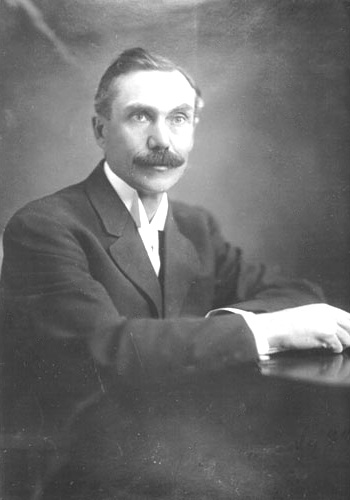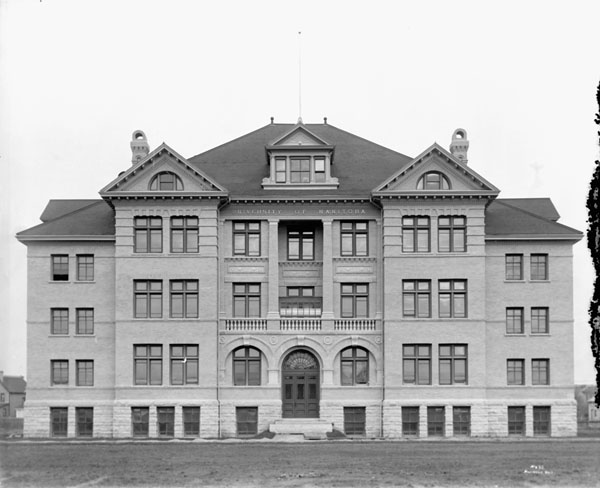|
J.A. Calder
James Alexander Calder (September 17, 1868 – July 20, 1956) was a Canadian politician. Biography Born in Oxford County, Ontario, he received his Bachelor of Arts degree from the University of Manitoba in 1888. He was a teacher and principal, before being elected to the Legislative Assembly of Saskatchewan for the riding of South Regina in the 1905 provincial election. A Liberal, he was re-elected in a 1908 by-election and in the 1912 election. From 1905 to 1912, he was the Minister of Education, Provincial Treasurer, and Minister of Railways. The rural village of Calder, SK was named after him when it was incorporated in 1911. From 1916 to 1917, he was the President of the Executive Council, Minister of Railways, and Minister of Highways. He was elected as a Unionist candidate to the House of Commons of Canada for the riding of Moose Jaw in the 1917 federal election. He held many ministerial positions including Minister of Immigration and Colonization, M ... [...More Info...] [...Related Items...] OR: [Wikipedia] [Google] [Baidu] |
The Honourable
''The Honourable'' (British English) or ''The Honorable'' (American English; see spelling differences) (abbreviation: ''Hon.'', ''Hon'ble'', or variations) is an honorific style that is used as a prefix before the names or titles of certain people, usually with official governmental or diplomatic positions. Use by governments International diplomacy In international diplomatic relations, representatives of foreign states are often styled as ''The Honourable''. Deputy chiefs of mission, , consuls-general and consuls are always given the style. All heads of consular posts, whether they are honorary or career postholders, are accorded the style according to the State Department of the United States. However, the style ''Excellency'' instead of ''The Honourable'' is used for ambassadors and high commissioners. Africa The Congo In the Democratic Republic of the Congo, the prefix 'Honourable' or 'Hon.' is used for members of both chambers of the Parliament of the Democratic Repu ... [...More Info...] [...Related Items...] OR: [Wikipedia] [Google] [Baidu] |
Canadians
Canadians (french: Canadiens) are people identified with the country of Canada. This connection may be residential, legal, historical or cultural. For most Canadians, many (or all) of these connections exist and are collectively the source of their being ''Canadian''. Canada is a multilingual and Multiculturalism, multicultural society home to people of groups of many different ethnic, religious, and national origins, with the majority of the population made up of Old World Immigration to Canada, immigrants and their descendants. Following the initial period of New France, French and then the much larger British colonization of the Americas, British colonization, different waves (or peaks) of immigration and settlement of non-indigenous peoples took place over the course of nearly two centuries and continue today. Elements of Indigenous, French, British, and more recent immigrant customs, languages, and religions have combined to form the culture of Canada, and thus a Canadian ... [...More Info...] [...Related Items...] OR: [Wikipedia] [Google] [Baidu] |
Provincial Treasurer
In Canadian politics the Provincial Treasurer is a senior portfolio in the Executive Council (or cabinet) of provincial governments. The position is the provincial equivalent of the Minister of Finance and is responsible for setting the provincial budget A budget is a calculation play, usually but not always financial, for a defined period, often one year or a month. A budget may include anticipated sales volumes and revenues, resource quantities including time, costs and expenses, environmenta .... In most provinces the title of the position has changed to Minister of Finance in recent years. See also * Treasurer Government in Canada Treasurers {{Canada-gov-stub ... [...More Info...] [...Related Items...] OR: [Wikipedia] [Google] [Baidu] |
Education In Saskatchewan
Education in Saskatchewan, Canada, teaches a curriculum of learning set out by the Government of Saskatchewan through the Ministry of Education. The curriculum sets out to develop skills, knowledge and understanding to improve the quality of life. On June 22, 1915, Hon. Walter Scott, Premier and Minister of Education, set out as his mandate the "purpose of procuring for the children of Saskatchewan a better education and an education of greater service and utility to meet the conditions of the chief industry in the Province, which is agriculture". Education facilitates the cultural and regional socialization of an individual through the realisation of their self-potential and latent talents. Historically, the region of Saskatchewan needed successful homesteaders so the focus was to develop a unified language for successful economic trading, and agricultural understanding to develop goods, livestock and cash crops to trade. After the mechanized advancements following the ... [...More Info...] [...Related Items...] OR: [Wikipedia] [Google] [Baidu] |
1912 Saskatchewan General Election
The 1912 Saskatchewan general election was held on July 11, 1912 to elect members of the Legislative Assembly of Saskatchewan. Premier Walter Scott led the Liberal Party of Saskatchewan to a third term in office with a significant increase in the share of the popular vote. The opposition, now renamed from the Provincial Rights Party to the Conservative Party of Saskatchewan and led by Wellington Bartley Willoughby, lost both votes and seats in the legislature. Results Notes: * 1 Results compared to those of Provincial Rights Party in 1908 election, which became the Conservative Party. * 2 There were 54 seats contested at the 1912 election, however Cumberland was declared void and only 53 people were elected. A by-election was held on September 8, 1913 to fill the vacancy that existed in Cumberland. Members of the Legislative Assembly elected For complete electoral history, see individual districts By-election, September 8, 1913 See also * List of Saskatchewan political pa ... [...More Info...] [...Related Items...] OR: [Wikipedia] [Google] [Baidu] |
Saskatchewan Liberal Party
The Saskatchewan Liberal Party is a liberal political party in the Canadian province of Saskatchewan. The party was the provincial affiliate of the Liberal Party of Canada until 2009. It was previously one of the two largest parties in the province, along with the Saskatchewan New Democratic Party and its precursors on its left, before being eclipsed by the Progressive Conservative Party of Saskatchewan from the right and later deserted by several members who contributed to the establishment of the Saskatchewan Party, the new centre-right dominant in the province since 1997. History Early history The party dominated Saskatchewan politics for the province's first forty years and provided six of the first seven Premiers who served between the province's creation in 1905 and World War II. Located on the middle of the political spectrum, it assiduously courted "ethnic" (i.e., non-British) voters and the organized farm movement. It refused to pander to " nativist" sentiment that culm ... [...More Info...] [...Related Items...] OR: [Wikipedia] [Google] [Baidu] |
1905 Saskatchewan General Election
The 1905 Saskatchewan general election was the first provincial election in the newly created Canadian province of Saskatchewan. It was held on 13 December 1905 to elect members of the Legislative Assembly of Saskatchewan. Walter Scott led the Liberal Party of Saskatchewan to victory over the Provincial Rights Party of Frederick W. A. G. Haultain, and became the first Premier of the new province. Members of the Legislative Assembly elected For complete electoral history, see individual districts Note: :*In 1907 by order of the Legislative Assembly Samuel Donaldson of the Provincial Rights party was declared elected and Peter Tyerman lost his seat. See also * List of Saskatchewan political parties ReferencesSaskatchewan Archives Board – Election Results By Electoral Division [...More Info...] [...Related Items...] OR: [Wikipedia] [Google] [Baidu] |
Bachelor Of Arts
Bachelor of arts (BA or AB; from the Latin ', ', or ') is a bachelor's degree awarded for an undergraduate program in the arts, or, in some cases, other disciplines. A Bachelor of Arts degree course is generally completed in three or four years, depending on the country and institution. * Degree attainment typically takes four years in Afghanistan, Armenia, Azerbaijan, Bangladesh, Brazil, Brunei, China, Egypt, Ghana, Greece, Georgia, Hong Kong, Indonesia, Iran, Iraq, Ireland, Japan, Kazakhstan, Kenya, Kuwait, Latvia, Lebanon, Lithuania, Mexico, Malaysia, Mongolia, Myanmar, Nepal, Netherlands, Nigeria, Pakistan, the Philippines, Qatar, Russia, Saudi Arabia, Scotland, Serbia, South Korea, Spain, Sri Lanka, Taiwan, Thailand, Turkey, Ukraine, the United States and Zambia. * Degree attainment typically takes three years in Albania, Australia, Bosnia and Herzegovina, the Caribbean, Iceland, India, Israel, Italy, New Zealand, Norway, South Africa, Switzerland, the Canadian province of ... [...More Info...] [...Related Items...] OR: [Wikipedia] [Google] [Baidu] |
Head Teacher
A head master, head instructor, bureaucrat, headmistress, head, chancellor, principal or school director (sometimes another title is used) is the staff member of a school with the greatest responsibility for the management of the school. In some English-speaking countries, the title for this role is '' principal.'' Description School principals are stewards of learning and managing supervisors of their schools. They aim to provide vision and leadership to all stakeholders in the school and create a safe and peaceful environment to achieve the mission of learning and educating at the highest level. They guide the day to day school business and oversee all activities conducted by the school. They bear the responsibility of all decision making and are accountable for their efforts to elevate the school to the best level of learning achievements for the students, best teaching skills for the teachers and best work environment for support staff. Role While some head teachers still ... [...More Info...] [...Related Items...] OR: [Wikipedia] [Google] [Baidu] |
Teacher
A teacher, also called a schoolteacher or formally an educator, is a person who helps students to acquire knowledge, competence, or virtue, via the practice of teaching. ''Informally'' the role of teacher may be taken on by anyone (e.g. when showing a colleague how to perform a specific task). In some countries, teaching young people of school age may be carried out in an informal setting, such as within the family (homeschooling), rather than in a formal setting such as a school or college. Some other professions may involve a significant amount of teaching (e.g. youth worker, pastor). In most countries, ''formal'' teaching of students is usually carried out by paid professional teachers. This article focuses on those who are ''employed'', as their main role, to teach others in a ''formal'' education context, such as at a school or other place of ''initial'' formal education or training. Duties and functions A teacher's role may vary among cultures. Teachers may provide ... [...More Info...] [...Related Items...] OR: [Wikipedia] [Google] [Baidu] |
University Of Manitoba
The University of Manitoba (U of M, UManitoba, or UM) is a Canadian public research university in the province of Manitoba.''University of Manitoba Act'', C.C.S.M. c. U60. Retrieved on July 15, 2008 Founded in 1877, it is the first of . Both by total student enrolment and campus area, the U of M is the largest university in the province of Manitoba and the 17th-largest in all of Canada. Its main campus is located in the |
Progressive Conservative Party Of Canada
The Progressive Conservative Party of Canada (PC; french: Parti progressiste-conservateur du Canada) was a centre-right federal political party in Canada that existed from 1942 to 2003. From Canadian Confederation in 1867 until 1942, the original Conservative Party of Canada participated in numerous governments and had multiple names. In 1942, its name was changed to the Progressive Conservative Party under the request of Manitoba Progressive Premier John Bracken. In the 1957 federal election, John Diefenbaker carried the Tories to their first victory in 27 years. The year after, he carried the PCs to the largest federal electoral landslide in history (in terms of proportion of seats). During his tenure, human rights initiatives were achieved, most notably the Bill of Rights. In the 1963 federal election, the PCs lost power. The PCs would not gain power again until 1979, when Joe Clark led the party to a minority government victory. However, the party lost power only ... [...More Info...] [...Related Items...] OR: [Wikipedia] [Google] [Baidu] |




